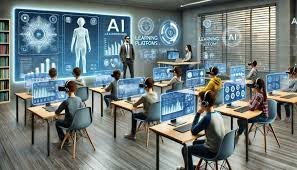The education system in the United Arab Emirates (UAE) is undergoing a major transformation. Schools across the country are integrating more digital tools to enhance learning and improve student engagement. This shift towards technology-driven education is part of the UAE’s broader vision to modernize its education sector and prepare students for a tech-driven future.
Why Digital Learning?
The use of digital tools in classrooms has grown rapidly worldwide, and the UAE is no exception. The government recognizes the importance of technology in shaping the future and has taken significant steps to incorporate it into the education system. Digital learning helps students develop essential skills such as problem-solving, critical thinking, and adaptability, which are crucial in the modern world.
Smart Classrooms and Interactive Learning

Many schools in the UAE are adopting smart classrooms equipped with interactive whiteboards, tablets, and e-learning platforms. These tools make lessons more engaging and interactive compared to traditional teaching methods. Instead of relying only on textbooks, students now have access to digital content, online videos, and interactive quizzes that make learning more fun and effective.

For example, some schools have introduced artificial intelligence (AI)-powered educational platforms that personalize lessons based on a student’s learning pace and preferences. This allows teachers to provide better support to each student, ensuring no one is left behind.
E-Books and Digital Resources

One major change is the shift from physical textbooks to e-books and digital resources. Many schools now provide students with tablets or laptops instead of heavy books. Digital textbooks are more convenient, easily accessible, and frequently updated with the latest information. This transition not only reduces the weight of school bags but also makes studying more flexible, as students can access their materials anytime, anywhere.
Additionally, online libraries and educational platforms offer a vast range of resources that students can explore beyond their curriculum, encouraging independent learning.
The Role of Online Learning Platforms
The COVID-19 pandemic accelerated the adoption of online learning, and many of those changes have now become permanent. Schools continue to use platforms like Microsoft Teams, Google Classroom, and Zoom for online lessons, assignments, and assessments. These platforms help students and teachers stay connected, making education more accessible even outside the classroom.
Some schools have also introduced virtual reality (VR) and augmented reality (AR) in their lessons. These technologies allow students to explore historical sites, conduct virtual science experiments, and even practice real-world skills in a simulated environment.
Teachers and Parents Adapt to the Change
The integration of digital tools has also required teachers and parents to adapt. Many schools offer training programs to help teachers effectively use new technologies in their teaching. Parents, too, are encouraged to familiarize themselves with digital learning platforms to support their children’s education at home.
While some parents worry about increased screen time, experts say that digital learning, when used correctly, can enhance education rather than replace traditional learning methods. The key is to balance digital and offline activities to ensure a well-rounded education.
Challenges and Concerns
Despite the many benefits, the transition to digital learning comes with challenges. Not all students have equal access to digital devices or high-speed internet at home. Some teachers also find it challenging to shift from traditional teaching methods to technology-based approaches.
The UAE government is addressing these issues by providing digital devices to students in need and improving internet accessibility. Many schools also offer additional training to teachers to help them smoothly transition to digital teaching methods.
The Future of Education in the UAE
The UAE’s commitment to digital education is part of its larger vision to become a global leader in technology and innovation. With continued investment in smart classrooms, AI-driven learning, and advanced educational platforms, the future of education in the UAE looks promising.
As more schools embrace digital tools, students will gain better opportunities to develop the skills needed for future careers. The shift towards digital learning is not just about convenience but about preparing the next generation for a world that is becoming increasingly technology-driven.
With these advancements, the UAE is setting an example for other countries looking to modernize their education systems. As digital learning becomes the norm, the country’s students will be better equipped for success in an ever-evolving global landscape.
Also read: UAE Companies Must Have Women on Boards by 2025—Here’s What It Means













